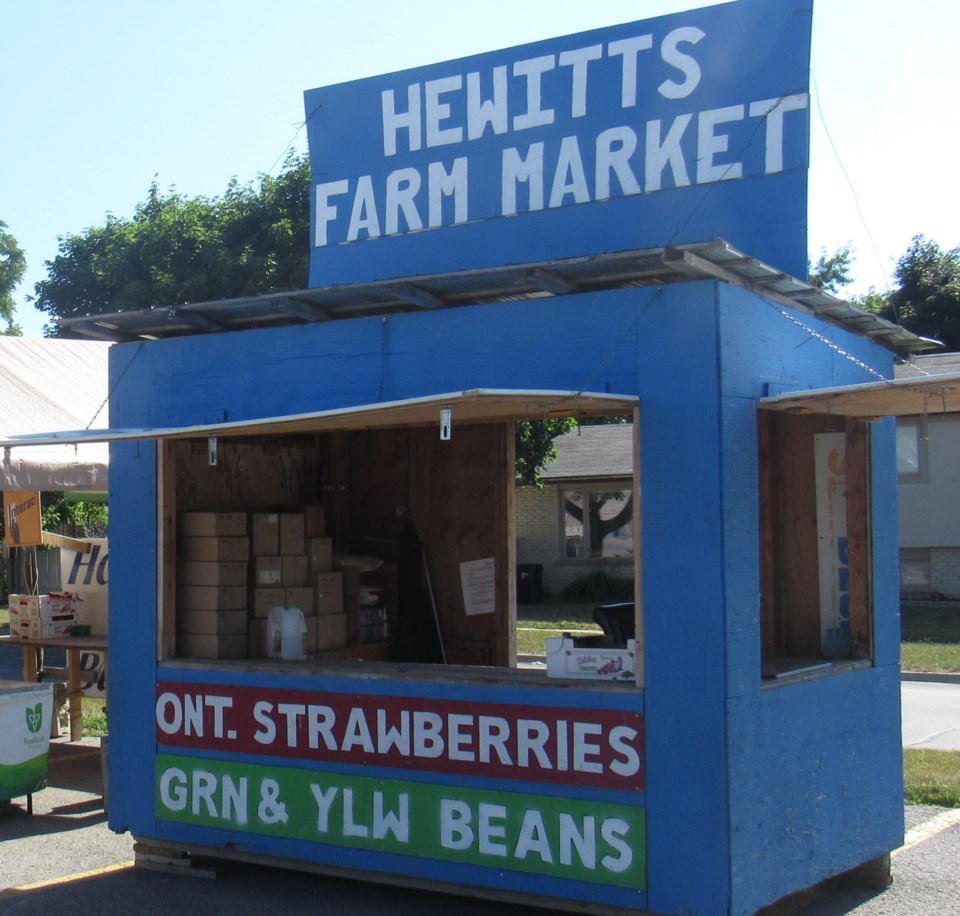In an effort to draw local produce vendors back into Orillia, city council has reduced its licensing fee and expanded the area vendors may source their produce from.
Council committee voted Monday to reduce the licensing fee from $508 to $275, and to allow produce to be sourced from anywhere in Ontario. The decision will be subject to ratification at Monday’s council meeting.
Previously, under Chapter 700 of the city’s Municipal Code, vendors were only permitted to sell produce originating from the townships of Severn, Ramara and Oro-Medonte.
Prior to the reduction in fees, Orillia’s was the highest in Simcoe County, with the next-most expensive licensing fee coming in at $350 in Penetanguishene.
All other municipalities in the county charge less than $300, and a number of others do not regulate produce stands through licensing.
With no vendors operating within Orillia over the past two years, city staff and council began exploring options to bring produce stands back to the city.
Council members debated allowing produce from anywhere in the world to be sold, expanding its limits to include all of Ontario, or maintaining the status quo, ultimately settling on the second option.
“As a municipality that just passed a climate change action plan, anything we can do that limits the distance a tomato has to travel, that’s important,” said Coun. Tim Lauer. “I had no problems before with just being local around the townships, but certainly, if we want to expand it to Ontario, I’m OK with that.”
Some members of council argued there should be no restrictions on where produce is sourced from.
“The more competition there is, because of the cost of vegetables, which are so important to the health of young people, as well as ourselves — the more competition, the better,” said Coun. Ralph Cipolla. “(With) more competition, we’ll have the best possible prices.”
As council debated lowering its licensing fee, members of staff and council suggested drafting a report to determine a number that would ensure the city could cover its expenses. Coun. Ted Emond, however, stressed the importance of making a decision quickly for the upcoming season.
“Our residents had become used to having several vendors located at a couple of locations, who withdrew from the city because of our constraints,” he said.
“Those people are now making decisions about what they’re going to do this summer. They’re not going to make those decisions in July; they’re going to make those decisions now."
Emond said it is “absolutely ridiculous that we’re sitting here talking about something in the neighbourhood of $150, $200, $300 … when we made millions in surplus in operations last year.
“I agree, in principle, we always should discuss these things at budget time, but sometimes it makes more sense to do it when it’s appropriate, and today is appropriate, so let’s get the dang thing done.”
Local produce vendor Trevor Hewitt was pleased with the changes council made to its regulations and licensing fee. Hewitt withdrew his produce stand from the city in 2021, citing difficulties brought about by stringent bylaws, which marked the first time in 45 years his business did not sell produce in Orillia.
“Orillia was the hardest place for us to deal with (out of) all the different cities and townships we deal with,” he told OrilliaMatters. “Now that they’ve changed the bylaw, we’ll definitely start looking for a spot again.”
Hewitt said the main crop he grows is corn, and that he often supplements his inventory by purchasing produce from other Ontario farms, which created issues with operating his business in Orillia.
“We do corn really well, and we use other people that do, say, tomatoes really well or peaches really well. Peaches, we couldn’t even grow here if we wanted to, but we’ve used the same farmer for years. We know how they’re grown. We know everything about it,” he said.
“We have good standing relationships with a bunch of different farmers within Ontario and, that being said, we still try to get it as local as we can.”
Local farmer Jacob Kearey-Moreland, however, argues there are still a number of barriers that could prevent people from offering their products in the city.
“It’s really hard to actually produce food locally and sell it profitably. To consider paying $275 or $500, going and getting the criminal background checks at the police station, and then finding a commercial property,” he told OrilliaMatters.
“As a farmer in Oro-Medonte, it’s easier for me to just set up at my road stand and have people drive to me than for me to go through the whole process of growing and harvesting, packing it up … finding a place to sell it, hiring someone … and then hope that I’m going to be able to generate enough sales.”
Kearey-Moreland, who is involved with both Sustainable Orillia and the Orillia Food Advisory Committee, also pointed out restricting vendors to commercial properties could prevent a number of people from selling their produce.
“At the food advisory committee, we actually came up with (an idea) to create designated areas within the city, perhaps in areas of the city where there aren’t as many grocery stores, designated areas that would be appropriate for pop-up produce vendors,” he said.
“If the goal was to make it easier for new, young and truly local growers to set up shop in Orillia and make nutritious, seasonal, affordable food more available to our hungry community, I think we still have a long way to grow.”
